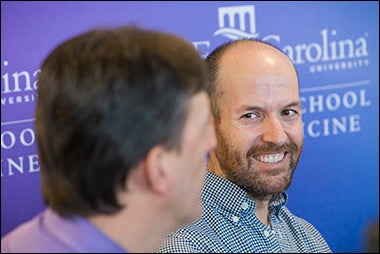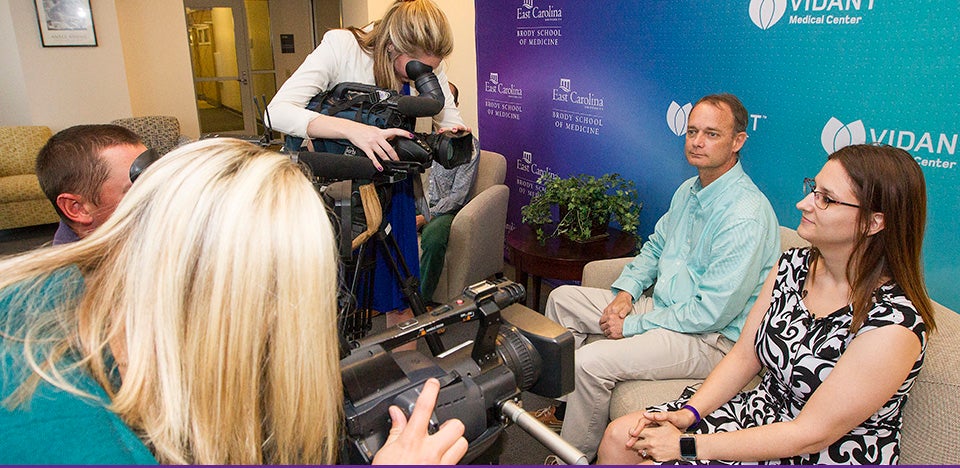MEETING THEIR MATCHES
ECU, Vidant kidney exchange patients gather for first time
The four donors and recipients involved in a recent kidney exchange at Vidant Medical Center met all together for the first time March 27 on the medical center campus.
The surgeries were performed Dec. 23 by physicians from the Brody School of Medicine at East Carolina University and Eastern Urological Associates. The exchange was the third of its kind at Vidant; a six-person swap was done in 2011, and a double swap in 2013.

Donor Ken Lewis, left, was discovered to be a good match for kidney recipient Michael Tice, right.
“In all transplant cases, we want to give the recipients and donors the best advantage,” said Dr. Claire Morgan, assistant professor of surgical immunology and transplantation for Brody. “In these cases, we optimized outcomes for the organ recipients by swapping their intended donors to get better matches and lessen their chances of organ rejection.
“Transplantation is all about teamwork,” Morgan said, “and this gathering represents a great catch by a lot of people in our program. It’s wonderful to be able to share in the joy of these successes.”
Roger Woolard, the 50-year-old organ recipient from Bath, is a veteran of the transplantation program. In 1990 his brother donated a kidney to him that lasted 25 years. His wife donated a kidney to him in 2014, but his body rejected it. He then turned to his friends for help, and 50-year-old Ken Lewis of Laurinburg was one of the first to call.
Although the transplant program discovered Lewis was not a good match for Woolard, he was a good match for a patient who’d been waiting for a kidney even longer than Woolard had: 39-year-old Michael Tice of Greenville.
Meanwhile, Tice’s fellow band member at Jarvis United Methodist Church in Greenville, 29-year-old Robin Melendez of Winterville, wanted to donate her kidney to Tice. She was a good match for Tice, but an equally good match for Woolard. The transplant team presented her with the option to donate to Woolard instead, thus allowing Tice to receive a better-matched organ from Lewis.

Dr. Claire Morgan, assistant professor of surgical immunology and transplantation for the Brody School of Medicine.
“I told them, ‘If it’ll help Mike get better, I’ll do it,” she said. Once she got past her initial fears, she said, the rest was easy. “I had just two weeks of discomfort right after the surgery, but no changes or complications after that.
“I don’t feel any different physically,” Melendez said. “But spiritually, ever since the surgery, I feel closer to God and a tighter connection with other people.”
Morgan explained that the donor operations were done laparoscopically – a minimally invasive technique where the surgeon makes three or four small incisions in the belly and side and performs most of the surgery with tiny probes and a camera. Routine donor operations take from 2 to 2.5 hours, she said.
The transplant surgery is more invasive and takes about three hours.
Organ recipient Tice said, “I don’t know why I was blessed to get this gift. But I do know there was a reason, and I will be looking for ways I can give back to others.”
The other organ recipient, Woolard, who was accompanied by his wife and two children, was overcome with emotion when he spoke of his initial meeting with his donor, Melendez. “I told Robin today that saying ‘thank you’ every day for the rest of my life will never be enough,” he said. “That’s why it was so important to me and my wife for our kids to come and meet her today. For over a year, I’d been feeling too sick and tired to play with my kids.”

Registered nurse Karen Chamberlain, who helped keep the swap and transplant process on track, speaks with the families of donors and recipients.
Lewis, who donated his kidney to Tice, said, “All of us here have a strong faith. I believe when given an opportunity, good people step up and try to make a difference in the world.”
On meeting Tice for the first time, Lewis said, “When I turned the corner to walk into the room, and I saw the look on his face, he didn’t have to say ‘thank you.’ I saw it in his eyes. If I had a couple more kidneys I could donate to someone, I’d do it again.”
Other experts involved in the procedure include Dr. Carl Haisch, transplant surgeon with the Brody School of Medicine at ECU; Dr. Jonathan Taylor, urologist with Eastern Urological Associates; Dr. Lorita Rebellato, ECU associate professor of pathology and laboratory medicine and director of the histocompatibility lab at Vidant Medical Center; and Karen Chamberlain, transplant coordinator for Vidant.
Kidney transplant surgery is one of the most common transplant operations in the United States and is often recommended for patients who have end-stage renal disease. The most common causes of kidney failure include diabetes, hypertension and autoimmune disease.
The ECU kidney transplant program began on the Vidant Medical Center campus in 1981. Doctors completed 114 kidney transplants in 2014.
There are currently 426 patients on the waiting list for a kidney at Vidant Medical Center. Morgan said one of the program’s immediate goals is to get more living donors to participate in the program.

Pictured below, Dr. Morgan speaks with the families of donors and recipients who gathered for the press conference.
